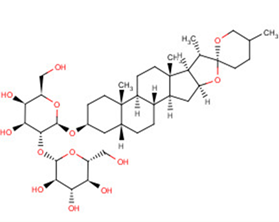
Timosaponin AIII
CAS No. 41059-79-4
Timosaponin AIII ( Timosaponin AIII )
产品货号. M18529 CAS No. 41059-79-4
Timosaponin AIII 诱导 HeLa 细胞自噬,随后导致细胞凋亡(IC50:10 μM)。
纯度: >98% (HPLC)
 COA
COA
 Datasheet
Datasheet
 HNMR
HNMR
 HPLC
HPLC
 MSDS
MSDS
 Handing Instructions
Handing Instructions
| 规格 | 价格/人民币 | 库存 | 数量 |
| 5MG | ¥518 | 有现货 |


|
| 10MG | ¥915 | 有现货 |


|
| 25MG | ¥1936 | 有现货 |


|
| 50MG | ¥2778 | 有现货 |


|
| 100MG | ¥4172 | 有现货 |


|
| 200MG | 获取报价 | 有现货 |


|
| 500MG | 获取报价 | 有现货 |


|
| 1G | 获取报价 | 有现货 |


|
生物学信息
-
产品名称Timosaponin AIII
-
注意事项本公司产品仅用于科研实验,不得用于人体或动物的临床与诊断
-
产品简述Timosaponin AIII 诱导 HeLa 细胞自噬,随后导致细胞凋亡(IC50:10 μM)。
-
产品描述Timosaponin AIII induces autophagy in HeLa cells followed by apoptotic cell death (IC50: 10 μM). The Timosaponin AIII cellular response is mediated via inhibition of mTORC1 and induction of ER stress (IC50: 2.5 μM, BT474 cells; 6 μM, MDAMB231). The Timosaponin AIII pro-apoptotic response is selective for tumor cells over normal cells but autophagy is induced in both.
-
体外实验Timosaponin AIII could inhibit acetylcholinesterase (AChE) activity, with an IC50 of 35.4 μM. Timosaponin AIII is identified as a major selective cytotoxic activity in BN108, and its selective cytotoxic activity involves inhibition of mTOR, induction of ER stress and protective autophagy.
-
体内实验Of the tested steroidal saponins, Timosaponin AIII (TA3) most potently improves memory deficits. Timosaponin AIII increases the scopolamine-induced reduction in step-through latency by 17% (10 mg/kg), 28% (20 mg/kg), and 43% (40 mg/kg). During the acquisition trial, no differences in latent time are observed. Timosaponin AIII (20, 40 mg/kg, p.o.) potently inhibits this reduction of acetylcholine in scopolamine-treated mouse brain. The inhibitory effect of Timosaponin AIII is comparable to that of tacrine, which is used as a positive control.
-
同义词Timosaponin AIII
-
通路Others
-
靶点Other Targets
-
受体mTORC1
-
研究领域Others-Field
-
适应症——
化学信息
-
CAS Number41059-79-4
-
分子量740.92
-
分子式C39H64O13
-
纯度>98% (HPLC)
-
溶解度In Vitro:?DMSO : 125 mg/mL (168.71 mM)
-
SMILES[C@]12([C@@H]3[C@H](C[C@H]1[C@H]1[C@H](CC2)[C@@]2([C@H](CC1)C[C@H](CC2)O[C@H]1[C@H](O[C@@H]2O[C@@H]([C@H]([C@@H]([C@H]2O)O)O)CO)[C@H]([C@H]([C@H](O1)CO)O)O)C)O[C@@]1([C@H]3C)CC[C@H](CO1)C)C
-
化学全称[(25S)-5?-Spirostan-3?-yl]2-O-(?-D-glucopyranosyl)-?-D-galactopyranoside
运输与储存
-
储存条件(-20℃)
-
运输条件With Ice Pack
-
稳定性≥ 2 years
参考文献
1. Wu ZT, et al. Acta Pharmacol Sin. 2014 Sep;35(9):1188-98.
产品手册




关联产品
-
WAY-118959-A
GM-90257 是一种微管乙酰化 (microtubule acetylation) 抑制剂,可直接与 α-微管蛋白结合。GM-90257 可防止 α-微管蛋白乙酰转移酶 1 (αTAT1) 募集至 α-微管蛋白中的 K40 残基。GM-90257 会导致 MDA-MB-231 细胞凋亡 (apoptosis),对微管乙酰化水平相对较低的 MCF-10A 或 MCF-7 细胞影响较弱。
-
Ponsegromab
Ponsegromab (PF 06946860) 是一种有效的,选择性的人源化抗 GDF15 抗体抑制剂,具有抗恶病质活性。 Ponsegromab 与 GDF15 结合并阻止其与 GFRAL 结合,从而阻断 GDF15/GFRAL 介导的信号传导。 Ponsegromab 可用于癌症研究。
-
4-methyloxy-Genistin
4''-methyloxy-Genistin is a natural product.



 021-51111890
021-51111890 购物车()
购物车()
 sales@molnova.cn
sales@molnova.cn







